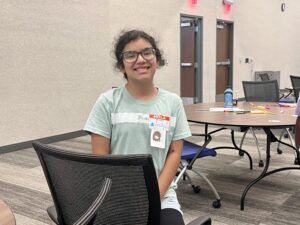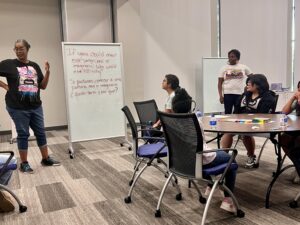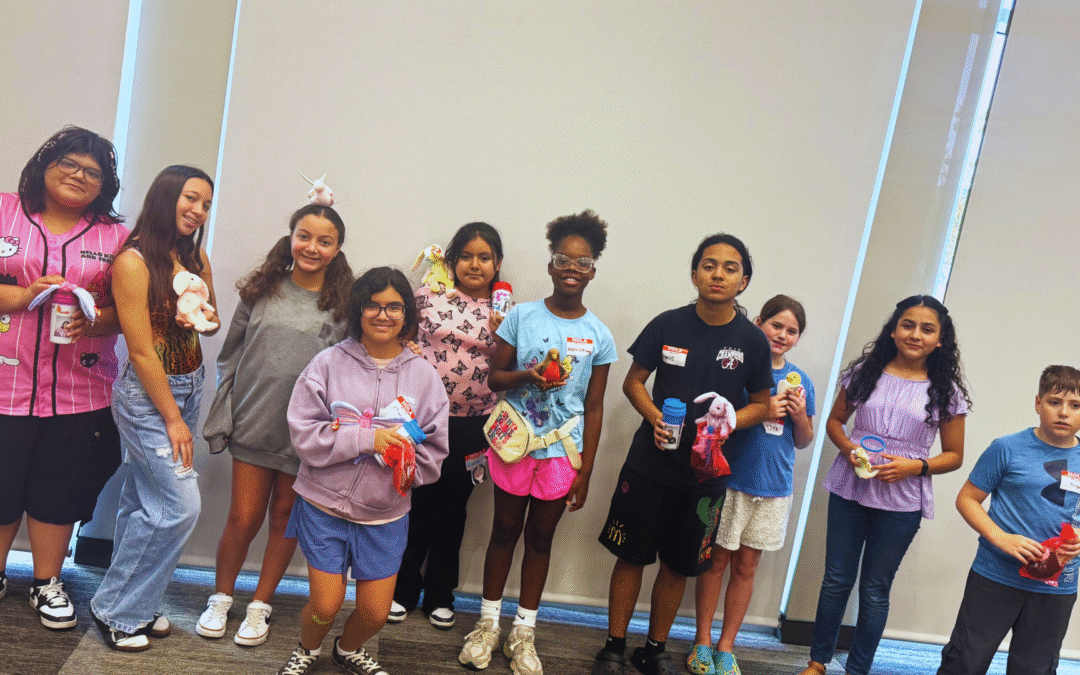When living in the shadow of a sibling’s disability, the other siblings may feel the need to grapple for attention and self-identity. Out of necessity parents often spend more time and focus on the child with special needs, and their siblings must learn to navigate the complex feelings this may cause. CREOKS Sibshops offers monthly workshops to shine the spotlight on the siblings of those with disabilities. From celebrating their hobbies to heart-to-heart conversations about home life, Sibshops is a safe space to be seen and heard.
Community Educator-Array of Hope & Sibshops Coordinator, LuKiesha Edwards said, “It’s important for the siblings to know that they are a huge part of the family story. We want to make sure they understand that their voice is also important.”

Sibshop attendee Maria shows off her smile.
The kids enjoy games, crafts, prizes and meaningful discussions. Sibshop leaders ask big questions to fuel conversation. For example: “If you could meet one person (real or imaginary,) who would it be and why?” The natural storytelling that these questions elicit is a powerful way to connect with peers.
Sibshop participant, Scarlett has a brother with autism, and sometimes, she struggles to communicate with him. But Sibshops encouraged her to keep the conversation going. “We learn to appreciate the disability and stop seeing our siblings as a difficulty,” she said.
“You learn to embrace the disability and see it from a different perspective.”
 Another segment of the program is a “Sibling Question Game.” Sitting in a circle, Edwards asks the attendees to consider a question from not only their viewpoint but also the view of their sibling with a disability. This practice in critical thinking and open dialogue creates a safe environment, which allows the students to better connect and share their experiences.
Another segment of the program is a “Sibling Question Game.” Sitting in a circle, Edwards asks the attendees to consider a question from not only their viewpoint but also the view of their sibling with a disability. This practice in critical thinking and open dialogue creates a safe environment, which allows the students to better connect and share their experiences.
Sibshop participant, Rosalynn explained “I have trust issues, but I feel like I can just relax here away from the problems that I have in my house with my siblings because they have autism.”
During the sibling question game, a participant shared she didn’t know how to manage her brothers anger issues, and another kid questioned why her siblings “can’t just listen to our parents.” These are the moments when Sibshops shine. Through discussion, the kids discover advice and sincere understanding.
Another significant goal of Sibshops is to teach the next generation of caregivers. These siblings will likely have the longest-lasting relationship with the person who has a disability. CREOKS Director of Developmental Disability Services and Business Development, Molly Ziriax explained, “As parents age and pass away, siblings often assume support responsibility for their brothers and sisters.”
With such significant responsibilities in their future, Sibshops helps the children increase tolerance, encourage empathy, appreciate small successes and many other valuable lessons. One of the unique outcomes of Sibshops is “the siblings often choose services occupations: nurses, educators and of course, advocates for special needs issues,” Ziriax added.
By shining the light on the siblings and equipping them with the tools to better understand their loved one, they inevitably flourish. Edwards shared a story of one child who refused to speak at all, and in a matter of months, she was telling her story. “They walk away with confidence and the ability to communicate in a healthy way,” Edwards said. “It’s the perfect opportunity for them to find themselves.”

